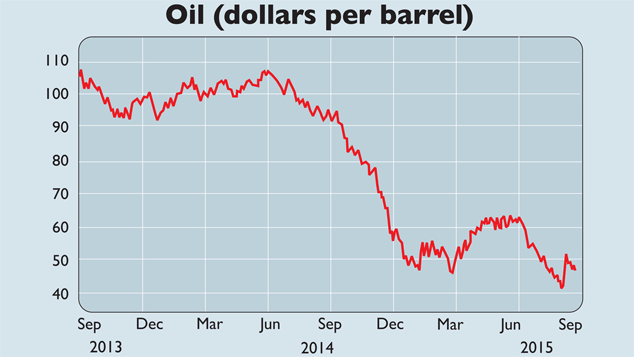Will the oil price be lower for longer?
Could US oil prices really fall to $20 a barrel? Analysts at Goldman Sachs predict it might.

Get the latest financial news, insights and expert analysis from our award-winning MoneyWeek team, to help you understand what really matters when it comes to your finances.
You are now subscribed
Your newsletter sign-up was successful
Want to add more newsletters?

Twice daily
MoneyWeek
Get the latest financial news, insights and expert analysis from our award-winning MoneyWeek team, to help you understand what really matters when it comes to your finances.

Four times a week
Look After My Bills
Sign up to our free money-saving newsletter, filled with the latest news and expert advice to help you find the best tips and deals for managing your bills. Start saving today!

Could US oil prices really fall to $20 a barrel? It sounds like a mighty plunge from the current level of about $45. But that is the latest suggestion from analysts at Goldman Sachs, who reckon that "the oil market is even more oversupplied than we had expected". Goldman has a history of making headline-grabbing predictions for the oil market. In 2005, when oil was at a record above $50, it warned of a potential "super-spike" above $100 in 2007. Oil hit this level in early 2008. But its subsequent forecast of a possible surge to $200 didn't work out quite so well.
The investment bank has warned that this "worst-case scenario" of $20 may occur if production doesn't decline as expected over the next year. Storage space is a crucial factor here. If there is nowhere to store reserves, prices would immediately need to drop below the cost of production to dissuade producers from pumping more oil (otherwise they could still make a profit from selling it).
For some American shale oil producers, the cost of production is roughly $20 a barrel. Meanwhile, Goldman Sachs has cut its 2016 average price estimate for US crude to just $45 a barrel, from $57 in May. The bank's analysts think that Brent crude, currently trading at just below $50 a barrel, will average $49.50 next year, down from an initial forecast of $62.
MoneyWeek
Subscribe to MoneyWeek today and get your first six magazine issues absolutely FREE

Sign up to Money Morning
Don't miss the latest investment and personal finances news, market analysis, plus money-saving tips with our free twice-daily newsletter
Don't miss the latest investment and personal finances news, market analysis, plus money-saving tips with our free twice-daily newsletter
It's certainly hard to see the glut clearing any time soon. US demand ticked up in the summer due to lower petrol prices, note Nicole Friedman and Benoit Faucon in The Wall Street Journal, but the slowdown in China is offsetting this, and so demand is highly unlikely to match supply. Oil from Iran is also set to come onto the market as sanctions are eased.
Meanwhile, US production, having risen by 75% between 2008 and 2015 thanks to the shale revolution, has proved surprisingly resilient to the price plunge, as shale drillers have managed to trim their costs and improve their technology. The bounce in prices earlier this year also persuaded some to keep going.
Following the latest slide in prices, however, the rig count has declinedagain and the International Energy Agency is forecasting that non-Opec supply will drop by 1% next year. Add this all up and we are unlikely to see prices embarking on a new uptrend for the next few months. In the short term, says Michael Lynch on Forbes.com, prices will do what J.P. Morgan always predicted for stocks: "fluctuate".
Get the latest financial news, insights and expert analysis from our award-winning MoneyWeek team, to help you understand what really matters when it comes to your finances.

-
 Should you buy an active ETF?
Should you buy an active ETF?ETFs are often mischaracterised as passive products, but they can be a convenient way to add active management to your portfolio
-
 Power up your pension before 5 April – easy ways to save before the tax year end
Power up your pension before 5 April – easy ways to save before the tax year endWith the end of the tax year looming, pension savers currently have a window to review and maximise what’s going into their retirement funds – we look at how